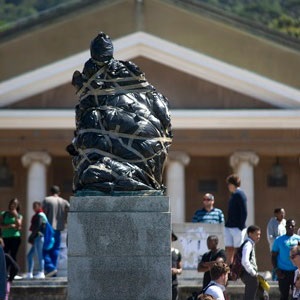
Max du Preez
The turbulence around the Cecil John Rhodes statue also has a positive side: it gives us a glimpse into the frustrations and aspirations of the emerging black middle class.
It is this middle class on which we base our hopes for stability and progress in the long term. The students we see toyi-toying in Cape Town and elsewhere are the political and corporate leaders of tomorrow, the senior civil servants and the professionals.
Scenario mappers have thus far focused on the anger of the poor and unemployed as a threat to stability. The rage of the black middle class has not received much attention.
Last week the EFF annihilated the ANC-aligned SASCO during the election for a new student representative council at the Vaal University of Technology. It was yet another indication that the militant EFF is perhaps more attractive to the new (and aspirant) middle classes than it is to the impoverished masses.
While I supported the removal of the Rhodes statue from the start - I argued for it in a column two years ago - I think a little bit of cynicism is also in order.
'Institutional racism'
These students are too young to have experienced the humiliation of apartheid themselves. Many if not most of them appear to be the children of middle class parents (or beneficiaries of generous bursaries) and all of them are privileged compared to the millions of young black people stuck in the townships, squatter camps or traditional rural areas.
When they talk about “institutional racism” at their university, they are rather vague.
They demand that many more black academics be appointed, but they haven’t adequately responded to explanations by people like UCT vice chancellor Max Price that there is a dire shortage of black PhDs and professors.
They demand that the curriculum should be changed from a Western to an African idiom, but then they mostly talk about disciplines like history and philosophy. Surely disciplines such as accounting, science, medicine and engineering are taught in more or less the same way all over the world.
But this doesn’t make their agitation illegitimate. They’re struggling to assert themselves, to feel completely comfortable at institutions previously dominated by white students and where the academic corps and university leadership are still largely white. Many of them feel under pressure, unrecognised and insecure.
These feelings are also present among younger black professionals and people in white-collar jobs and junior management.
For a change the target of black anger is not solely focused on Afrikaner arrogance and racism, but on the more subtle prejudices and perceived superiority complexes of white English speakers - students refer to them as white liberals.
Post-apartheid governments’ failures?
The scathing, often insulting and sarcastic reaction by many white English speakers to the Rhodes debate the last two weeks proves to me that this phenomenon is indeed alive and well.
In an interaction I had with some of the students on the UCT campus last week I asked them if part of their anger wasn’t also a feeling of shame and betrayal because of the post-apartheid governments’ failures of the last two decades.
My argument was that they would not have danced and shouted around the Rhodes statue if these governments had managed the education of especially black youngsters better, if they had governed more effectively and with less corruption and nepotism, and if they had done much more to make it possible for more young blacks to go to university.
My questions were not received well. As a white person I had no right to tell black people who they should govern themselves, was the prevailing argument. And yet it was clear to me that they partly agreed. They just found it hard to admit to a white man that a black government had failed them. Their rage against the symbolism of colonialism and apartheid did not exclude their unhappiness with the performance of the ANC since 1994.
Still, I was impressed with them. They were not violent; they had strong and sophisticated arguments; and only a few really want to see the statue destroyed rather than have it removed from its dominant, hero-worshipping position on campus. Most of them agree with the argument that one should not photoshop history, but maintain that this should not mean one can not deal with offensive symbols.
Hyperbolic nonsense
Of course there are the opportunists. Like Julius Malema, always ready to jump on an issue of high emotion, who urged people to destroy Rhodes and other pre-1994 symbols physically and without following any process.
Like the UCT sociology professor who warned on the weekend that a racial war would surely follow if we didn’t give the students what they want. What hyperbolic nonsense.
All universities, not only UCT, should urgently consider fundamental changes to their decision-making structures such as university councils and senates to accommodate the voices of students more.
White South Africans – and the ANC government – should listen and try to understand the anger rather than to shout down or insult the students – and by extension, the broader emerging black middle class.
Two decades after democracy, it is clear that the political tide is turning. If we ignore it, it will be at our own peril.
- Follow Max on Twitter.
Disclaimer:
News24 encourages freedom of speech and the expression of diverse views. The views of columnists published on News24 are therefore their own and do not necessarily represent the views of News24.
* Only comments that contribute to a constructive debate will be approved by moderators.




 Publications
Publications
 Partners
Partners






















